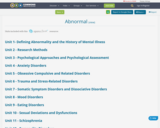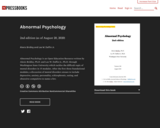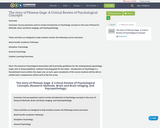
Selection of reading resources for Abnormal Psychology courses.
These resources were compiled by Dr. Susan Harvey, Professor at Delta College
- Subject:
- Life Science
- Material Type:
- Reading
- Date Added:
- 09/19/2018

Selection of reading resources for Abnormal Psychology courses.
These resources were compiled by Dr. Susan Harvey, Professor at Delta College

This LibGuide was designed to accompany a community college course in Abnormal Psychology. It contains original material created by the instructor (Mind Maps and Focus Questions), as well as supporting readings gathered from other open sources and some links to freely available copyrighted material. Institutions with a subscription to the LibGuides platform may want to make a copy so they can adapt it to local needs and control the content.

This Open Educational Resource text has been created from a combination of original content and materials compiled and adapted from a number of open text publications.Attributions are more clearly delineated in the License and Attributions area of this textbook, including descriptions of which sections were edited prior to their inclusion.This Open Textbook is designed to be a comprehensive coverage of Psychopathology and Abnormal behavior in a clinical context, reflecting past and current research, including coverage of the DSM-5. Note from the author* : The variability of the in text citations and the absence of foot notes, reflect the very nature of this compilation of various source materials. We hope that this will not distract the reader. Original texts can be found by following the attribution url, for those interested in original authors, especially when a reference to research has been made.*Dr. Sonja Miller is a Clinical Psychologist and Visiting Assistant Professor at Suny Albany and Adjunct Professor of Psychology at Hudson Valley Community College (at the State University of New York at Albany).

Abnormal Psychology is an Open Education Resource written by Alexis Bridley, Ph.D. and Lee W. Daffin Jr., Ph.D. through Washington State University. The book tackles the difficult topic of mental disorders in 15 modules. This journey starts by discussing what abnormal behavior is by attempting to understand what normal behavior is. Models of abnormal psychology and clinical assessment, diagnosis, and treatment are then discussed. With these three modules completed, the authors next explore several classes of mental disorders in 5 blocks. Block 1 covers mood, trauma and stressor related, and dissociative disorders. Block 2 covers anxiety, somatic symptom, and obsessive-compulsive disorders. Block 3 covers eating and substance-related and addictive disorders. Block 4 tackles schizophrenia spectrum and personality disorders. Finally, Block 5 investigates neurocognitive disorders and then ends with a discussion of contemporary issues in psychopathology. Disorders are covered by discussing their clinical presentation and DSM Criteria, epidemiology, comorbidity, etiology, and treatment options.

This course is a survey of the scientific study of human nature, including how the mind works, and how the brain supports the mind. Topics include the mental and neural bases of perception, emotion, learning, memory, cognition, child development, personality, psychopathology, and social interaction. Students will consider how such knowledge relates to debates about nature and nurture, free will, consciousness, human differences, self, and society.
Course Format
This course has been designed for independent study. It includes all of the materials you will need to understand the concepts covered in this subject. The materials in this course include:
A full set of Lecture Videos by Prof. John Gabrieli.
Reading Assignments in several books, including one free online textbook and detailed notes on another book.
Assorted multiple choice and short answer questions to Check Yourself on the material in each session.
Supporting Discussion content that elaborates on the lectures and reading.
A rich collection of online resources for Further Study on each session’s topics.
A full set of Exams with solution keys, and extra practice questions for review.

Topic 12: Psychological DisordersTextbook readings: pp. 545-546; pp. 549-550; pp. 555-581; pp. 590-596.Watch: Discovering Psychology: Discovering Psychology: Psychopathology (Program 21)Psychopathology is the twenty-first program in the DISCOVERING PSYCHOLOGY series. Through glimpses of the original theories of Philippe Pinel, this program explores the biological and psychological components of mental illness, as well as the role of genetics and cultural factors. It also takes a closer look at a few of the major mental illnesses like depression, neurosis, manic-depressive disorders, and schizophrenia.©2001 WGBH Educational Foundation All Rights ReservedWatch: The Mind - Series Homepage Produced by Colorado State University. 1999, all descriptions are from series website.The Mind: Mood Disorders: Mania and Depression (Module 31)Presents vivid examples of the mood fluctuations of patients who suffer from periodic affective episodes.The Mind: Mood Disorders: Hereditary Factors (Module 32)Illustrates the findings of a 10-year study that involved 12,000 volunteers in an Amish community and represents a careful analysis of genetic factors related to manic-depressive disorders.The Mind: Mood Disorders: Medication and Talk Therapy (Module 33)Shows the effectiveness of combining drug therapies with traditional psychotherapy.Watch:The Brain - Series Homepage Produced by Colorado State University. 1997, all descriptions are from series website.The Brain: Schizophrenia: Symptoms (Module 26)In this module, mental health professionals observe a patient named Jerry, a classic schizophrenic. Jerry's case and medication schedule are described, and his disordered speech and behavior are shown. Prominent psychiatrists describe schizophrenia and the prognosis for those diagnosed with this disease; a locked psychiatric ward provides a graphic illustration.The Brain: Schizophrenia: Etiology (Module 27)This module covers the history of attitudes, beliefs, and theories about the etiology of schizophrenia. While the illness was long thought to be environmentally caused, this module emphasizes the scientific evidence in support of its organic origins. Dr. Arnold Scheibel of UCLA Medical Center describes cellular pathology in the hippocampus and speculates on the possible role of viruses. A genetic component is also demonstrated.The Brain: Autism (Module 29)This module opens with statistics and a description of autism and how the disorder has been viewed historically. Studies now support the theory that autism results from a lack of normal neural growth during prenatal development. Dr. Temple Grandin of Colorado State University, severely autistic as a child, is presented as someone who overcame her autism and managed to use her way of perceiving the world to her advantage.Learning objectives:1. Define psychological disorder and psychopathology.2. State the main features of psychological disorders according to the APA (American Psychiatric Association).3. Describe how the DSM (Diagnostic and Statistical Manual of Mental Disorders) is used to classify or categorize disorders.4. Explain the biological and the “diathesis-stress” models of psychological disorders. 5. Describe main features (symptoms) of these psychological disorders: Anxiety Disorders (and within this category, “phobia” and “panic disorder” and “social anxiety disorder”); Obsessive-Compulsive and Related Disorders (and within this category, “body dysmorphic disorder”), PTSD (Posttraumatic Stress Disorder), Mood Disorders (and within this category, “major depressive disorder” and “bipolar disorder”), Schizophrenia; ADHD (Attention Deficit Hyperactivity Disorder) and Autistic Spectrum Disorder.6. Discuss major theories that seek to explain what “causes” Anxiety Disorders, Mood Disorders, Schizophrenia, ADHD and Autistic Spectrum Disorder.

This Open Educational Resource text has been created from a combination of original content and materials compiled and adapted from a number of open text publications.Attributions are more clearly delineated in the License and Attributions area of this textbook, including descriptions of which sections were edited prior to their inclusion.This Open Textbook is designed to be a comprehensive coverage of Psychopathology and Abnormal behavior in a clinical context, reflecting past and current research, including coverage of the DSM-5. Note from the author* : The variability of the in text citations and the absence of foot notes, reflect the very nature of this compilation of various source materials. We hope that this will not distract the reader. Original texts can be found by following the attribution url, for those interested in original authors, especially when a reference to research has been made.*Dr. Sonja Miller is a Clinical Psychologist and Visiting Assistant Professor at Suny Albany and Adjunct Professor of Psychology at Hudson Valley Community College (at the State University of New York at Albany).*Minimal adjustments made By Dr. Debra J Matchinsky at North Hennepin Community College include the name of the text and cover image created by Dr. Matchinsky using free images from Pexels.com.

Psychology is designed to meet scope and sequence requirements for the single-semester introduction to psychology course. The book offers a comprehensive treatment of core concepts, grounded in both classic studies and current and emerging research. The text also includes coverage of the DSM-5 in examinations of psychological disorders. Psychology incorporates discussions that reflect the diversity within the discipline, as well as the diversity of cultures and communities across the globe.Senior Contributing AuthorsRose M. Spielman, Formerly of Quinnipiac UniversityContributing AuthorsKathryn Dumper, Bainbridge State CollegeWilliam Jenkins, Mercer UniversityArlene Lacombe, Saint Joseph's UniversityMarilyn Lovett, Livingstone CollegeMarion Perlmutter, University of Michigan



By the end of this section, you will be able to:Understand the problems inherent in defining the concept of psychological disorderDescribe what is meant by harmful dysfunctionIdentify the formal criteria that thoughts, feelings, and behaviors must meet to be considered abnormal and, thus, symptomatic of a psychological disorder

This course involves the study of victims and witnesses of crime. An emphasis will be placed on the psychological and emotional detriments associated with being victimized and the classification of the types of victims. Students will learn how to apply criminological theory to address why offenders choose their victims. Additionally, students will examine a victim’s reaction to crime.

Summary: Survey questions used to review Introduction to Psychology concepts in the area of Research Methods, Brain and Brain Imaging, and Psychopathology. These activities are designed to help students master the following course outcomes:MassTransfer Academic PathwaysDiscipline: PsychologyGeneral PsychologyStudent Learning Outcomes Note: The American Psychological Association (2013) provides guidelines for the undergraduate psychology major and, in those guidelines, outlines 5 learning goals for the major. Introduction to Psychology is a foundational course within the major and, as such, upon completion of the course students will be able to exhibit basic competencies within each of the five areas.